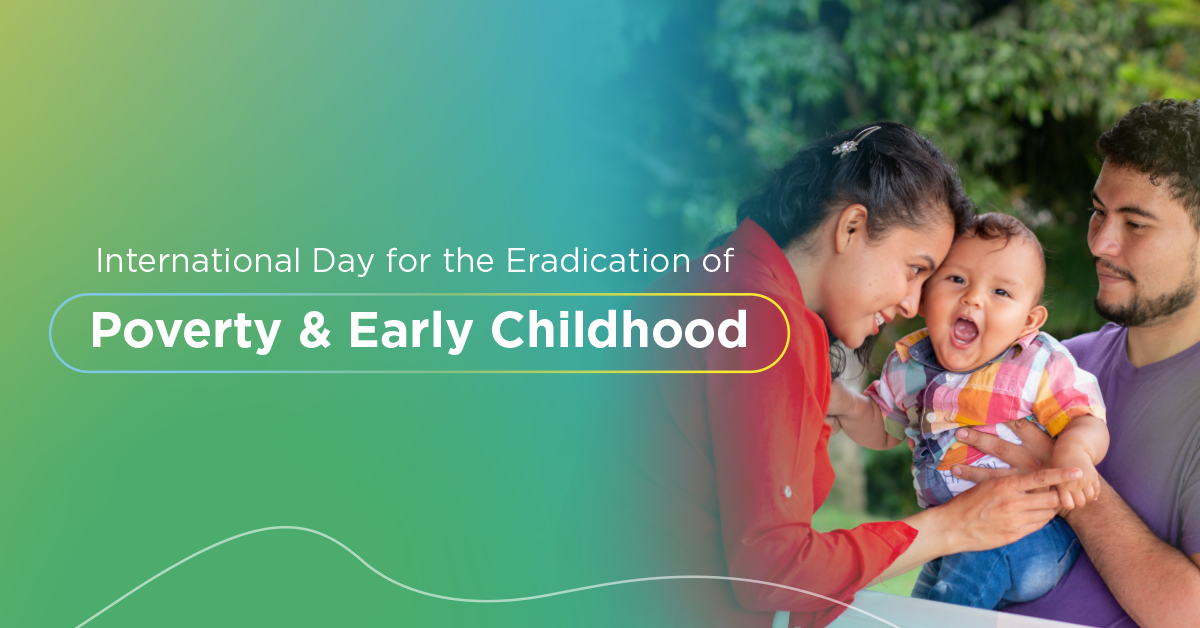Poverty is not just a lack of income: It is a multidimensional phenomenon comprising the satisfaction of multiple needs that are not necessarily related to financial resources. But, what does this have to do with Early Childhood Development? Although there are still knowledge gaps, the evidence is compelling: quality investments in early childhood are the most effective strategy to break the cycle of poverty.
Today, October 17, we commemorate the International Day for the Eradication of Poverty by sharing innovative strategies led by the Early Childhood Development Innovation Fund, achieving a significant impact on 700,000 children, 300,000 mothers, fathers and caregivers and 5,000 care centers in 10 countries in the region. These strategies are based on innovative solutions that improve Early Childhood Development, especially in contexts of poverty.
Below, we tell you about some of them.
Strategies with impact on preschool attendance
It is widely documented that access to care and education services makes it possible to overcome poverty and inequalities and achieve sustainable development. In terms of access to quality preschool care services, the region has made significant progress in terms of coverage, recognizing this level as an important stage for children to enter primary school with the necessary skills. However, there are still major challenges in terms of attendance and quality of services, for it is essential to carry out interventions with this focus.
In Uruguay, for example, preschool education is compulsory from the age of 4, but absenteeism is three times higher than in primary school. To combat this problem, the Innovation Fund developed a nationwide intervention that uses behavioral science to promote preschool attendance through greater involvement of parents and caregivers. This resulted in a large reduction in absenteeism and an improvement in some indicators of cognitive development, albeit only for children near the median of the baseline attendance rate distribution.
On the other hand, in Rio de Janeiro, Brazil, creches coverage has increased but there are knowledge gaps regarding the medium-term effects of access to childcare for poor children. One study showed that childcare attendance at age 0-3 years increased children’s elementary school completion as well as the number of days of attendance per year. In addition, the evidence shows that the provision of quality center-based childcare services improves household income by freeing up the mother’s time to enter the labor market.
Strategies with an impact on parenting practices
Supporting mothers, fathers and caregivers with tools on how to improve parenting patterns can have profound impacts on children’s lives in the long term. Quality interventions in this regard have shown effects into adulthood: they performed better in school, and, as adults, had better mental health, demonstrated less violent behavior and had higher incomes than similar individuals who did not benefit from such programs. The Innovation Fund has promoted projects of this type in Brazil, Jamaica and El Salvador.
In Boa Vista, Brazil, for example, the integration of parenting activities with existing group meetings with parents was promoted and the hybrid modality (WhatsApp) of a parenting program implemented during the pandemic was evaluated, which significantly increased the number of activities caregivers do with their children (reading, storytelling, singing, playing, walking outdoors, counting or enumerating).
In Jamaica, the hybrid modality was also explored to improve parenting practices, with interesting results: community health workers appreciated the flexibility of virtual methods, but prefer in-person visits to see the child and assess her development. Parents, on the other hand, appreciated the printed manual and the activities they could integrate into their daily routine.
In El Salvador, a program to promote growth mindset among caregivers and children in vulnerable communities was developed and evaluated. The results show that caregivers who received this training enhanced their parenting skills.
Strategies that improve the quality of services in childcare centers
When we talk about eradicating poverty, we know that early childhood is a unique age for investment in human capital. In fact, there is evidence of “the cost of inaction”, meaning that not investing in early childhood services costs governments almost two points of GDP.
Moreover, it is not enough to invest in coverage: care without structural and process quality (caregiver-child interactions) does not have an impact on the accumulation of human capital, which is what effectively brings children out of poverty. For this reason, the Innovation Fund has promoted projects that focus on this issue.
In Mexico, for example, it was necessary to diagnose the quality of public childcare services by type of provider and level of child development. The diagnosis showed high levels of safety and quality of physical infrastructure, but also identified opportunities to strengthen process quality.
In Colombia, in the face of the increasing wave of migration, we promoted comprehensive care for children, their families and pregnant women. On the other hand, in response to the lack of evidence on structured curricula for the development of socioemotional skills in childhood, we implemented a curriculum that had a significant impact on children’s prosocial behavior, self-awareness and cognitive learning. Center staff also showed higher levels of empathy, lower negative health symptoms, better pedagogical practices and a closer relationship with the children’s caregivers.
Fighting against poverty requires viewing development effectiveness as a holistic process that includes targeting impact, measuring what is important, learning and readjusting to acquire knowledge. The 23 projects of the Early Childhood Development Innovation Fund are committed to this purpose in order to make a positive and enduring impact early in life. We invite you to discover more effective strategies on our Innovation Fund results dashboard and join the conversation using the hashtag #ECDhubLAC.
The Early Childhood Development Innovation Fund is an alliance between the Inter-American Development Bank, FEMSA Foundation, Maria Cecilia Souto Vidigal Foundation, Porticus and Bernard Van Leer Foundation.


Leave a Reply